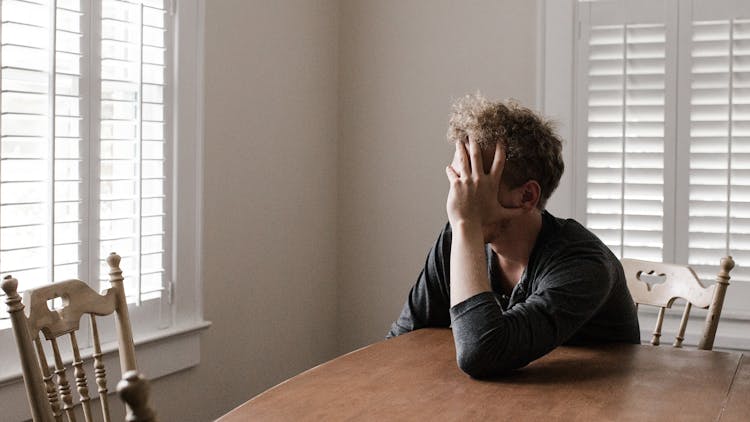Do you ever find yourself wishing you were a professional organizer just to keep your life of “stuff” under control? I’ve been there. We’ve all been there, haven’t we? Purchasing something we regretted—a car, new clothes, a house, new shoes, toys for our kids—whatever it may be, later wishing we hadn’t. Maybe you have mountains of debt from purchases you shouldn’t have made, or maybe you don’t, but you continually buy and it never makes you happy. Or maybe you have a good grasp on spending, but you just want a simpler life. Whatever the case, God can help us all in this area, and it starts with a simple understanding of the part we play in the eternal picture!
In a world that constantly sells, telling us to purchase the newest model, the latest gadget or the trendiest apparel, it’s a hard fight we’re up against to keep life simple. And Pinterest doesn’t make it easier! But I’m all about that simple life now, even though I wasn’t always that way. I like my house empty so there’s more room for people. I like my life simple, so I have more time to spend doing things besides cleaning and worrying about my stuff. Yes, of course, I want a comfortable homey space, and I have that! But I’ve discovered that a life of less is an extremely rich life. I’ve found a great balance in owning things without letting those things own me.
I remember reading this Scripture in Matthew 6:19-21 NLT and seeing my heart start to change about how I approached owning stuff. “Don’t store up treasures here on earth, where moths eat them and rust destroys them, and where thieves break in and steal. Store your treasures in heaven, where moths and rust cannot destroy, and thieves do not break in and steal. Wherever your treasure is, there the desires of your heart will also be.”
I so badly wanted to be someone who stored up the treasure of heaven, not the treasure of earth, so I began to find ways to simplify my life. Basically, I became the professional organizer of my own life and got rid of my stuff. I had two goals. First, I vowed to create margin with time. I decided that I no longer wanted to spend my Saturdays shopping and buying just so I could have more clothes to wash and a bigger house to clean. I wanted to spend those days with my family, serving other people, and becoming a better friend of God. So, I cleaned out my house. I gave away 42 bags of stuff, and I started simple again.
Second, I wanted to create margin with money, so I could have a larger generosity budget and a bigger heart toward others. My heart began to fill with the things that touched Jesus. It became easier to spend my time chasing important things—heavenly things. Over time, I started to realize that I had less and less, and I also began to realize that I missed, well, none of it.
Now sure, there are a bazillion ways to become your own professional organizer and simplify your life, but here are three things I do that I thought you may find doable, too!
3 Ways I Simplify My Life
- I only buy clothes in five colors. I know some of you are terrified to keep reading. But truly, I wear neutrals. Besides those, I only purchase clothing in two colors, olive greens and pinks. Why? Because it all matches! I can open my closet and pick any pair of pants and it matches any shirt or jacket. It cuts down on the time it takes to get dressed each day, which adds up over time. It also makes decisions simple. I don’t have to decide what color to buy because I already know my options. Sure, every now and then I might get a fun piece that doesn’t go by the rule, or I may receive a gift that I love, but I usually only have one or two of them at any given time.
- Every time I bring something home, I get rid of something else. Simplifying life can happen daily by donating or recycling things that are no longer needed. I’ve reduced my closet to a total of 12-20 shirts—including sweaters, t-shirts, layering pieces—that’s it. If I bring home a new shirt, I donate a shirt. If I bring home a new set of sheets, I think: Which set of sheets am I going to get rid of? This practice of pausing to consider what I would purge from my home in order to make room for a new thing is a healthy gauge of how much it’s actually needed in the first place. Remember that more is not always better. Most of the time more is just more to manage!
- I buy memories instead of things. When it comes to spending money, my husband and I focus on memories over things. That means we may give concert tickets as gifts, go on a road trip, or do a family activity instead of buying a new toy that may end up in the next garage sale. We may choose to buy new bikes for our kids to ride all summer or take them on a camping trip before we consider buying them more legos to sit on the shelf. There is nothing wrong with buying gifts for others, in fact, we love to do it! We simply spend more time considering the long-term impact and memory of the gift.
When I look at how Jesus lived when He was on earth, I see His life wasn’t spent purchasing things, forever searching the best deals, or creating the perfect experience. It was spent loving others, loving God, and continually being generous with His entire life. How can we be more like Him? As hard as it can be to live simply, we can all become the professional organizer we need because this lighter lifestyle comes with tremendous benefits. When you have less, you’ll find you actually have more—more money and much more contentment. Most importantly, you’ll have more time to store up the true treasures of heaven!


